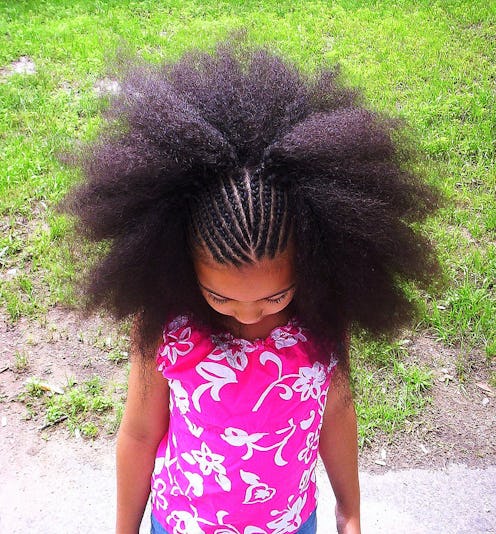
Although it seems race relations are off to a horrible start in 2015, a small victory was made when Federal courts ruled current Texan laws on African hair-braiding businesses unconstitutional on Monday. For those unfamiliar with the issue, Texas required these businesses to run as a fully equipped barber college before they were legally allowed to teach hair braiding techniques which takes an unnecessary financial toll on the business owner. The art of hair braiding doesn't include harsh chemicals nor does it involve sharp scissors or razors — in fact in terms of the hair stylist, hair braiding is one of the most natural and oldest traditions.
My father woke us up every morning by blaring Public Enemy's "Fight the Power" and opening me and my sister's bedroom doors to allow our Labrador to jump vigorously on our beds and wake us up, as if the sound of Flava Flav's booming voice hadn't already. Like most families with kinky, afro-textured hair, my mother did my sister's and my hair each morning before school. My mother wasn't professionally trained to do our hair; she certainly didn't hold a license or have any credentials other than having the same kinky 'fro as her children. The same 'fro that her mother braided.
The fact that teaching a cultural tradition that has been mastered by Aztec women, South American women, African women, and American women would have these restrictions was troubling, but unsurprising. In 2013, the same year that Isis Brantley sued the state of Texas for its unconstitutional hair braiding restrictions, an Ohio school banned braids and afro-puffs for students. Yes, in 2013 there was a mini war brewing on the natural hair community.
Putting restrictions on braids or learning how to braid also puts a restriction on our ability to have healthy hair. Braids have been used as a protective style for afro-textured hair BEFORE this country became the land of the free. While braids and natural hair have been used as political statements in the '60s and fashion statements in the '70s and '90s, they are much more than that. They are a necessity to protect the natural oils of our hair from being stripped and any attempt to take the right for folks of any culture to learn techniques to further the development of the natural hair community is a huge threat to racial tolerance in this country.
Whenever I find myself in front of the mirror, putting my fluffy hair into braids for the evening, I can hear the Public Enemy song my father blasted while my mother performed the art of braiding on my own hair. I know if my hair could sing, it would have sang it loud and proud when the Federal courts revoked these ridiculous restrictions on hair braiding.
Image: Pink Sherbert Photography/Flickr; Giphy